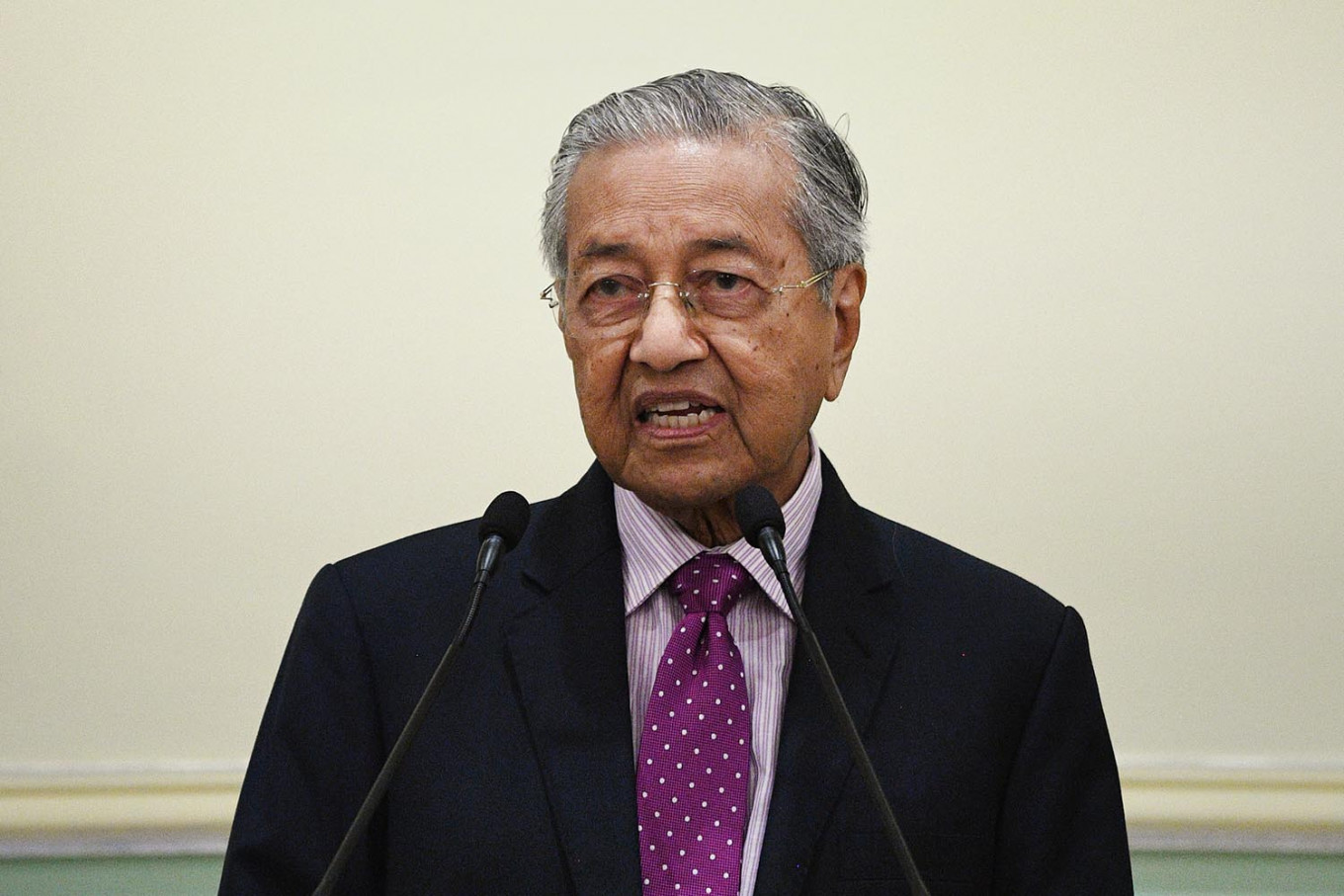Popular Reads
Top Results
Can't find what you're looking for?
View all search resultsPopular Reads
Top Results
Can't find what you're looking for?
View all search resultsThe Slim by-election: Mahathir’s last battle?
On Aug. 29, the residents of Slim, a small, rural and Malay-majority state seat will vote in a by-election. While the constituency is not usually on most people’s radar, this time around, strategists and analysts will be eagerly scrutinizing the results of the contest.
Change text size
Gift Premium Articles
to Anyone
O
n Aug. 29, the residents of Slim, a small, rural and Malay-majority state seat will vote in a by-election. While the constituency is not usually on most people’s radar, this time around, strategists and analysts will be eagerly scrutinizing the results of the contest.
On the one hand, voting in this constituency will be an indication of the feelings on the ground for the United Malays National Organization (UMNO), Malaysia’s erstwhile dominant party. On the other, it will be the debut of Malaysia’s newest party, Pejuang, the political vehicle of former prime minister Mahathir Mohamad. Beyond the fortunes of Barisan Nasional (BN) and Pejuang per se, the by-election will test the internal cohesion of the expanding Muafakat Nasional coalition as well as the recently-ousted Pakatan Harapan (PH) grouping.
The by-election is being called following the demise of the state assemblyperson for Slim and BN division chief for the Tanjung Malim parliamentary seat, Mohd Khusairi Abdul Talib, on July 15.
The communities in Slim are beneficiaries of federal government agricultural development initiatives and tend to be staunch supporters of the UMNO. Indeed, Slim has been held by UMNO since the constituency was established in 2004.
Despite the seat’s traditional affinity for BN and UMNO, support has been on a downward trajectory since the 2004 general election. In 2008 and 2013, votes for the ruling coalition fell and, as with the rest of the country, BN failed to obtain a majority in 2018 for the first time. One contributing factor was the three-way battle between BN, the Malaysian Islamic Party (PAS), and the Malaysian United Indigenous Party (PPBM) that year. While PAS had traditionally run against BN in the seat, PPBM was able to capitalize on cost of living issues as well as the 1MDB controversy to secure a third of the votes in 2018.
The Slim state seat is one of three within the Tanjung Malim parliamentary constituency. For its part, Tanjung Malim has traditionally been represented by the Malaysian Chinese Association (MCA) which, like UMNO, is a BN component party. Despite this track record, over the past two decades, the People's Justice Party (PKR) has built up its grassroots network in the constituency and, in 2018, its candidate there, Chang Lih Kang, beat the MCA candidate, Mah Hang Soon, by 5,000 votes.
Due to the benefits of incumbency, as well as its well-developed grassroots network, BN is regarded as the favorite to win the election. That said, COVID-19 has altered campaign dynamics by increasing the importance of social media at the expense of traditional and more expensive activities such as large-scale rallies.
BN has chosen a well-known local UMNO member, Mohd. Zaidi Aziz, as its candidate. Zaidi graduated from the International Islamic University Malaysia (IIUM) with a Bachelor’s degree in Islamic Studies.
As Pejuang remains unregistered, the party’s candidate, Amir Khusyairi, will stand as an independent in the by-election. Amir comes from a prominent religious family, and is a sharia lawyer and also an IIUM graduate. Compared to Zaidi, Amir is perceived as more of an outsider, coming as he does from the adjacent district of Telok Intan.
To its credit, the fledgling party has managed to assemble some party machinery in Slim, run by Pejuang volunteers from across the peninsula. However, the party’s campaign is leaning heavily on Mahathir’s personal popularity.
The third candidate is Santharasekaran Subramaniam, a teacher who recently resigned to stand as an independent in the elections. The only non-Malay contestant in the election, Subramaniam has focussed on the plight of Indians and plantation workers in the constituency.
Given its ethnic composition, agriculture-based economy, and voting history, Slim is a good bellwether for voting trends in Peninsular Malaysia’s Malay heartland. In addition, the campaign constitutes a unique test for the various political groupings, most notably the UMNO-PAS led Muafakat Nasional and the recently-ousted PH.
With regard to Muafakat Nasional, the Slim by-election will provide crucial insights on whether PAS supporters in rural constituencies will heed their leaders’ call to support an UMNO candidate. In the 2018 election, PAS made significant inroads in Slim among the younger electorate, and support for the Islamic party among under-40s is equal to, if not slightly higher than, for UMNO.
The Slim by-election also serves as a practical test of whether PAS and UMNO grassroots networks can collaborate effectively. Should the by-election indicate that PAS supporters refuse to back a UMNO candidate, or that concerted campaigning is not feasible, the simple reliance on “vote pooling” between UMNO and PAS in the next election may need to be revisited.
The newly-expanded Muafakat Nasional may suffer internal fault lines, but Pejuang has problems of its own as well. Despite clearly targeting PH supporters and desperately needing to use PH grassroots networks to canvas for support, Pejuang is not officially a PH member.
While Amanah leaders such as Khalid Samad and Mohamad Sabu have campaigned for Pejuang, it is PKR that has the strongest grassroots presence in Tanjung Malim, including in Slim.
There have been expressions of support from PKR vice president and MP for Tanjong Malim, Chang Lih Kang, as well as Tian Chua, another PKR vice president, but grassroots members and some state leaders are reluctant to campaign for Pejuang as Mahathir has yet to reconcile with PKR president Anwar Ibrahim.
Considering historical voting preferences in Slim, BN is likely to secure a victory come polling day. However, given the stakes, a narrow victory may not be sufficient.
In the 2018 general election the combined vote share for PAS and UMNO in the seat was 68 percent, with PAS garnering about 4,000 votes or 22 percent. Should Zaidi get significantly less than two thirds of the vote, it could mean that PAS supporters are not that inclined to support UMNO, particularly in areas where the Islamic party has been active and has fielded its own candidates in the past.
For its part, Pejuang will seek to attract the 6,000 votes that went to PPBM when that party was part of PH. However, should Pejuang garner a paltry share of the vote, say, less than 3,000, then that could indicate Mahathir’s appeal to rural Malays has fallen. In addition, given Pejuang’s Malay focus, non-Malay PH supporters may decide to stay at home or vote for Subramaniam as a sign of protest. Should that happen, this by-election could prove to be Mahathir’s last battle.










